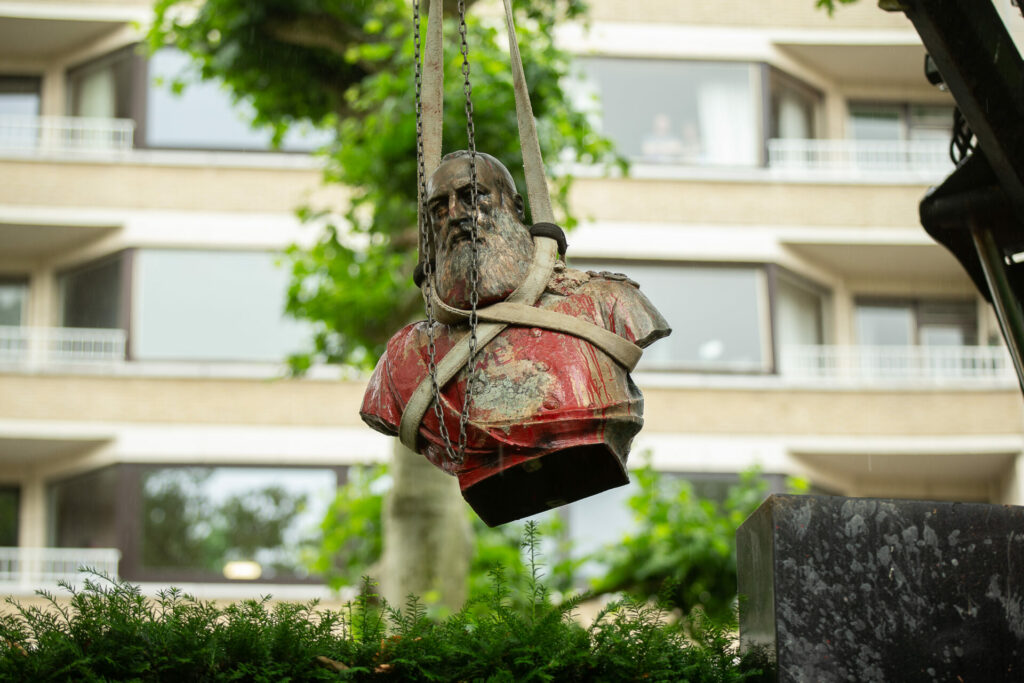Leader of the Francophone liberal MR party Georges-Louis Bouchez has said that the failure of the committee on Belgium's colonial past to agree on giving formal apologies to the Democratic Republic of Congo (DRC), Burundi and Rwanda is the fault of the committee's own chair, Wouter De Vriendt.
After more than two years of work, De Vriendt announced on Monday that the committee could not reach an agreement as various parties within the committee – specifically the liberal ones – disagreed with the part of the proposal that advised parliament to formally apologise for its colonial past.
"It is not the liberals who torpedoed the agreement, but the ecologists and Wouter De Vriendt himself," Bouchez railed in an interview with VRT's Terzake programme on Tuesday evening. "We agreed to 99% of the agreement. We just wanted the part about the 'apology' withdrawn and replaced by 'thorough and deep regret'."
On Monday, De Vriendt said that party chairs, as well as the Royal Palace, felt that an "apology" crossed a line. But Bouchez denies that the King or the Palace intervened.
'All or nothing'
In June this year, Belgium's King Philippe expressed his "deepest regret" for Belgium's colonial past in a speech delivered to the DRC's Parliament. While the difference is subtle, an official "apology" would go one step further and could clear the way for possible financial reparations.
"In Congo, the King was backed by the Government. As a country, we have to take a united stance. The position in the Chamber should be the same as agreed in the government," Bouchez said. "But for De Vriendt, it was all or nothing: no report without apologies. We have to educate Belgians about the colonial past and look to the future."
Earlier, De Vriendt said MR had initially agreed to apologising for Belgium's colonial past – which Bouchez retorted was absolutely incorrect. "De Vriendt came out in the press to defend an agreement that was never actually an agreement. That is not the role of a committee chair; he himself was responsible for this outcome of the committee."
De Vriendt also spoke of "messages" from the Royal Palace about "a great sensitivity regarding the apology." For Bouchez, this is "dangerous and scandalous finger-pointing at the Palace. We should not use the Palace to play political games, that is wrong."
Related News
- Congo Committee: Belgium fails to reach agreement on official apology for colonialism
- Joint approach to Dutch slavery apology would have been better, says Suriname
- One thousand Belgian soldiers to be deployed abroad in 2023
Reacting to Bouchez' statements, De Vriendt told VRT that the comments "make no sense at all," adding that it is peculiar that Bouchez should speak out about the colonial past committee and the consultations within the majority as "in those 2.5 years, I have seen him there zero times."
"On 13 October, MR agreed to an apology. In parliament at the time, the MR even actively participated in cooperating in the text," he said. "A few days later, this was suddenly blown up and vetoed. The MR never wanted to let go of the veto after that."
"As chair, I have constantly sought compromises. Apologies are an important symbolic reparation, that is my absolute conviction," De Vriendt said. "Yet, as chair, I have formulated proposals without apologies, just so as not to throw the baby out with the bathwater. That is also what Benoît Piedboeuf, group leader for MR, said in committee on Monday."

